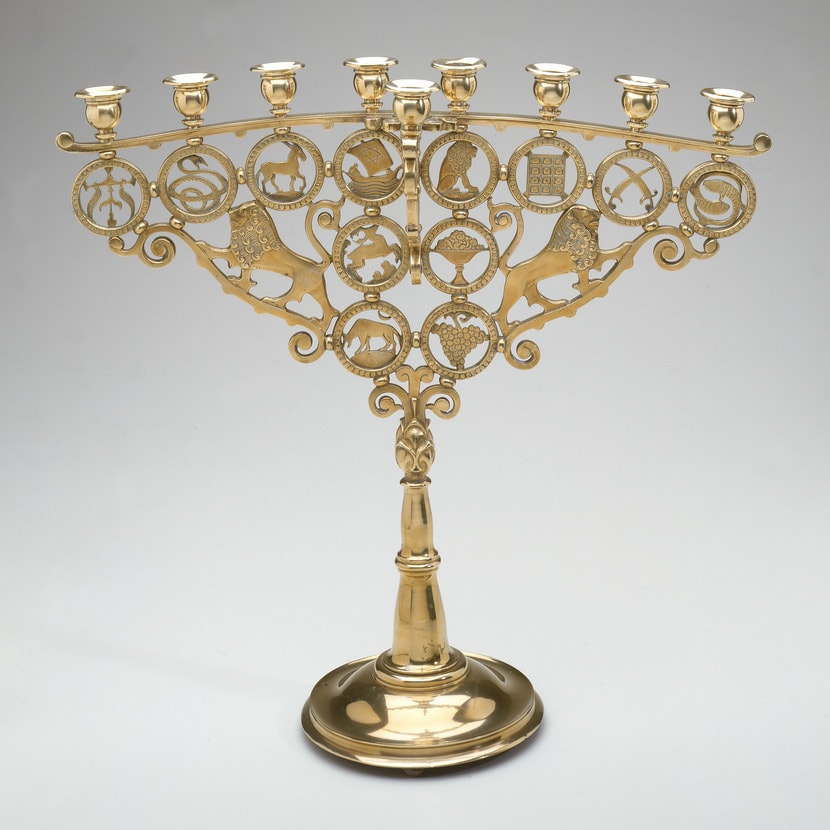
- Object Name:
- Hanukkah Lamp
- Artist/Maker:
- Arnold Zadikow
- Bio:
- b. 1884, Kolberg, Prussia (now Kołobrzeg, Poland); d. 1943, Theresienstadt, Czechoslovakia (now Terezín, Czech Republic)
- Place Made:
- Probably Munich (Germany)
- Date:
- 1920s
- Medium:
- Copper alloy: cast and traced
- Dimensions:
- 18 1/8 × 19 1/8 × 8 3/8 in. (46 × 48.6 × 21.3 cm)
- Credit Line:
- Gift of Dr. Harry G. Friedman
- Accession Number:
- F 1228
On View
Arnold Zadikow began his working career as a mason and then became a master builder. He soon turned to creating works of art, and during the course of his artistic life produced small plaques and medals, figurines in metal and terra-cotta, and large stone sculptures, including Jewish tombstones. The themes of many of his works were Jewish in nature and included Hebrew inscriptions and representations of biblical figures, such as his statue of David, or his Hanukkah lamp, seen here.
Combining elements of early-twentieth-century design with Jewish imagery, this lamp depicts the emblems of the Twelve Tribes of Israel. These are taken from Genesis 49, in which the patriarch Jacob/Israel blessed his twelve sons, comparing each to an animal or object that represented their character. For example, Judah was likened to a mighty lion, Issachar was an ass giving tribute to others, while Dan was the serpent who stung the Israelites into righteousness. The lotus flower at the top of the shaft and the graceful curve of the crossbar reflect the stylistic trends of Jugendstil, while the use of medallions are derived from Zadikow's early interest in medals. Only one other Hanukkah lamp is known to have been designed by Zadikow, a wooden one made in the concentration camp Theresienstadt, a year before his death in 1943.
Several different versions of this lamp are known. One was displayed in Rome during a Holy Year, almost certainly the one held in 1925, and thus provides an approximate date for its design. According to the museum's accession card, the Jewish Museum lamp once belonged to the Jüdische Museum in Berlin before World War II, and indeed an identical lamp was published as belonging to that museum in a 1933 Berlin Jewish newspaper.
Combining elements of early-twentieth-century design with Jewish imagery, this lamp depicts the emblems of the Twelve Tribes of Israel. These are taken from Genesis 49, in which the patriarch Jacob/Israel blessed his twelve sons, comparing each to an animal or object that represented their character. For example, Judah was likened to a mighty lion, Issachar was an ass giving tribute to others, while Dan was the serpent who stung the Israelites into righteousness. The lotus flower at the top of the shaft and the graceful curve of the crossbar reflect the stylistic trends of Jugendstil, while the use of medallions are derived from Zadikow's early interest in medals. Only one other Hanukkah lamp is known to have been designed by Zadikow, a wooden one made in the concentration camp Theresienstadt, a year before his death in 1943.
Several different versions of this lamp are known. One was displayed in Rome during a Holy Year, almost certainly the one held in 1925, and thus provides an approximate date for its design. According to the museum's accession card, the Jewish Museum lamp once belonged to the Jüdische Museum in Berlin before World War II, and indeed an identical lamp was published as belonging to that museum in a 1933 Berlin Jewish newspaper.
Information may change as a result of ongoing research.